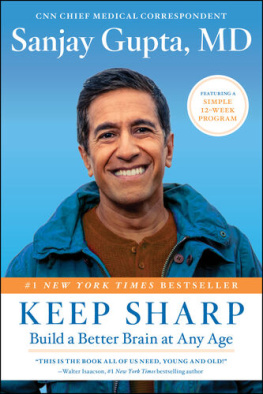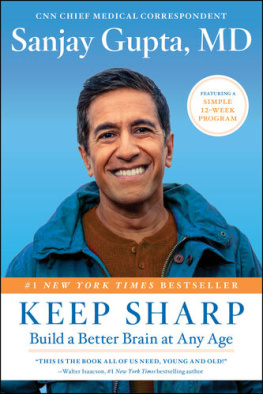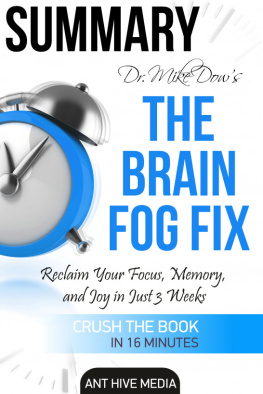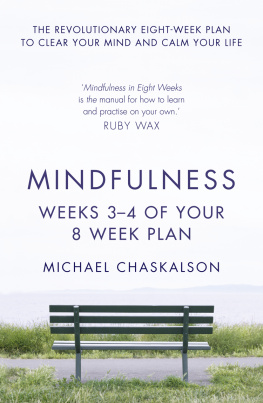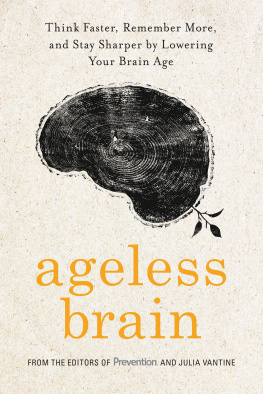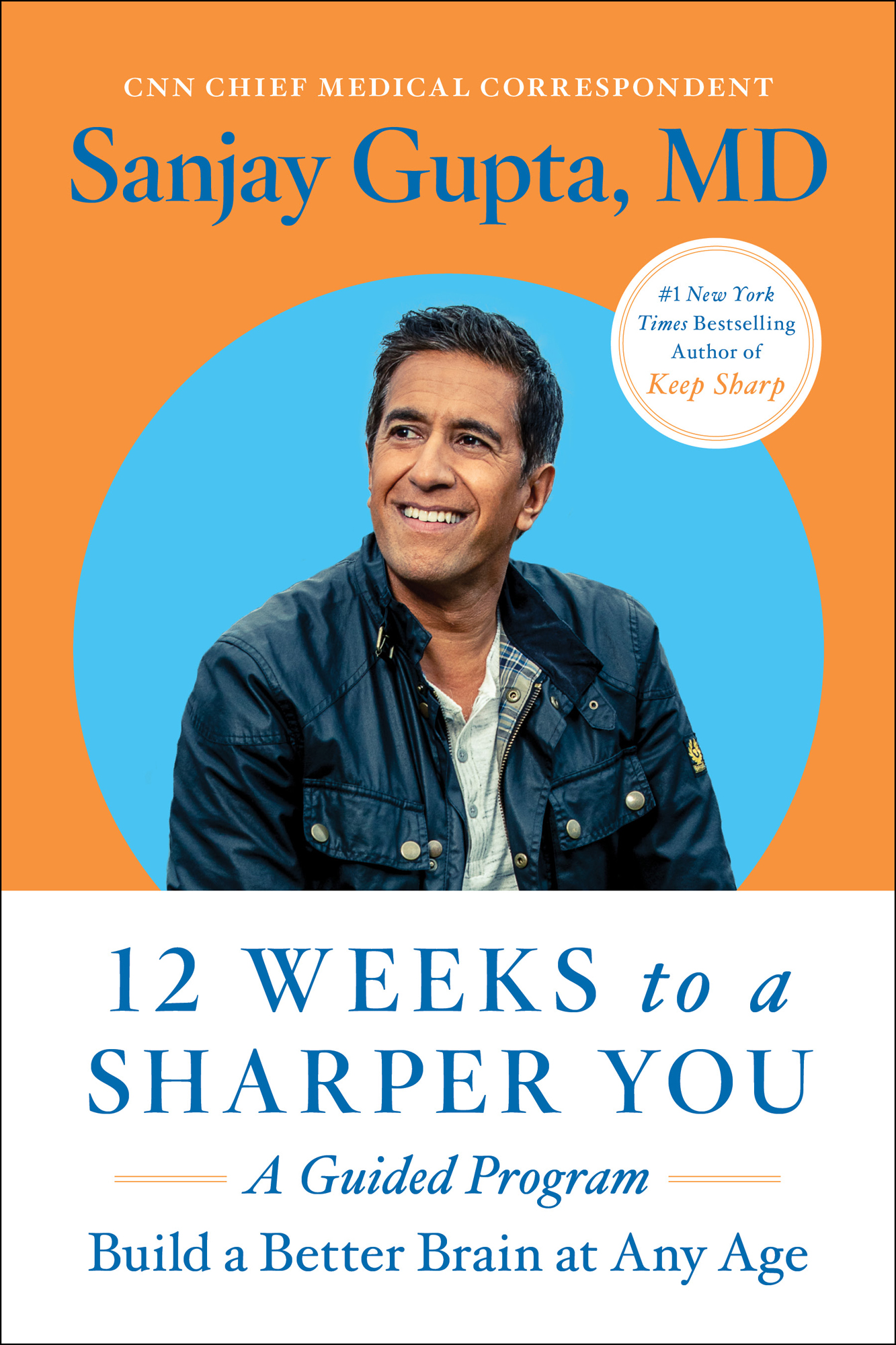CONTENTS
Guide
CNN Chief Medical Correspondent
Sanjay Gupta, MD
#1 New York Times Bestselling Author of Keep Sharp
12 Weeks to a Sharper You
A Guided Program
Build a Better Brain at Any Age
THIS WORKBOOK BELONGS TO:
START DATE:
DATE OF COMPLETION:
The chief function of the body is to carry the brain around.
Thomas Edison
For my three girls, Sage, Sky, and Soleil. In order of age, so as to preempt any future disputes over the dedication order. I love you so much, and watched you grow faster than this book. Always take the time to be completely present, because it is perhaps the best and most joyous way to keep your mind sharp and your life bright. You are still so young, yet you have given me a lifetime of memories I hope to never forget.
For my Rebecca, who has never wavered in enthusiasm. If in the end, our lives are just a collection of memories, mine will be filled of images of your beautiful smile and your steadfast support.
For anybody who has dreamed that their brain can be better. Not just free of disease or trauma, but optimized in a way that allows you to best build and remember your life narrative, and equips you to be resilient through lifes challenges. For anyone who has always believed their brain wasnt a black box, impenetrable and untouchable, but could be nourished and grown into something greater than they imagined.
INTRODUCTION A CALL TO PUT YOUAND YOUR BRAINFIRST
Welcome! And congratulations in advance. Youre only twelve weeks away from carrying around a better brain that has enormous potential to stay sharp for the rest of your life. No matter how old you are, the good news is its never too late to make a positive difference in how well your brain functions as the years tick by and you age. Its an incredibly responsive organ to our habitsan organ that we can improve on with the right choices. Indeed, your brain can be nourished and grown into something greater than youve ever imagined. And thats something that should motivate you to establish the habits that will keep you sharp for life. Theres nothing brainy about itanyone can build a better brain at any age. Whether youre twenty-two or ninety-two, youve come to the right place.
We used to think that we were born with a certain cache of neurons that would slowly deplete over our life. We were told substances like alcohol could accelerate that process, and there was no coming back. Keep in mind that most of these outdated notions were based on observations of the brain during a diseased state. For a long time, we only saw the brain at the time of autopsyafter its occupier was dead. This is how Alois Alzheimer first found the telltale plaques of the disease named after him at the turn of the twentieth century. And, up until recently, it was still only through an autopsy that a family member could be told of the Alzheimers diagnosis with certainty. As a neurosurgeon, I hardly ever look at healthy brains, but rather ones invaded by a tumor, filled with blood, or crushed by trauma. Point is, we have just begun to quantify the healthy brain. And thats critical because to maintain and improve a healthy brain, we must understand it as best we can.
Once we started to look at healthy brains, our fundamental understanding began to change. We saw the brain grow and regenerate not to repair damage, but rather to get better. And better. And better. We now know the brain can reliably revamp itself and be continuously optimized throughout ones life. We know the brain has a rinse cycle and can even predict when that cycle is most likely to occursleep. Think about that. You can spawn new brain cells and form new connections whether youre a teddy-bear-toting toddler, trailblazing twentysomething, or tennis-loving centenarian. Its not nearly as challenging as you might think, but it does require some conscientious effort and planning. Anything worthy of monumental change demands that, plus some patience and perseverance. But you can also have fun along the way and learn new things that will surpriseand entertainyou.
After all, we are talking about maintaining and improving the most enigmatic three and a half pounds of flesh in the known universe. It is the worlds most sophisticated, self-propagating supercomputer, with a parallel operating system known as consciousness. So, yes: We should take the necessary time to care for this critical system, keep it shiny and full of the right fuel for it to truly run on the bumpy road of life without consequence.
As you dive into this new workbook updated with the latest science, I want you to consider a fundamental question: What is a healthy brain? Sure, we can well define a healthy heart. Same goes for the liver, kidneys, even your spleen. But the brain? Many will say that a healthy brain is one devoid of cancer, trauma, stroke, or plaque that interrupts communication and destroys memory. However, that is defining health as simply the absence of disease. We must go further. We must be more ambitious.
A healthy brain not only manages memory well but it also connects patterns that would otherwise be missed. Those patterns are what facilitate and further bolster the brains memory-making and banking. A healthy brain is also one that is not easily crushed by the tough, stressful toll of daily life, but is instead strengthened by it.
We often think of a fit brain as one that can remember details well, but it is worth reconsidering this definition. What is memory anyway? We often think of it as a precise journal of past life events that we flip through like a Rolodex or filing cabinet (or maybe you see the comparison to scrolling through photos stored in your online digital cloud). From an evolutionary perspective, memory has served to recall situations, people, and sources of food and water to help protect and sustain life. But we now appreciate memory for its most powerful purpose: to reinforce our own lifes narrative, the story of us. And sometimes our memories arent entirely accurate but thats okay.
Truth is, within a given day, we probably pay attention to only 60 to 70 percent of all thats in front of us. Because the rest of our daily experience doesnt necessarily fill or contribute to the way we see our lifes narrative, we ignore it. That means a healthy brain is one that remembers the important things, while at the same time forgets the trivial. And yes, forgetting is just as important as remembering, and can even help us sharpen our brains and make room for newand more valuableinformation. Scientists only discovered our forgetting neurons in 2019 in a groundbreaking study that further revealed the importance of sleep, a time period when these specialized brain cells spring into action. Its a beautiful paradox: In order to remember, we have to forget to some extent. As the wonderful evolutionary biologist Robert Sapolsky told me, a healthy brain is also one that has a wide circle of youa brain inclusive to new ideas and new people. A brain less dismissive, and more welcoming.

